(优选)2019八年级英语上册Unit2Howoftendoyouexercise讲义(新版)人教新目标版
- 格式:doc
- 大小:66.00 KB
- 文档页数:13
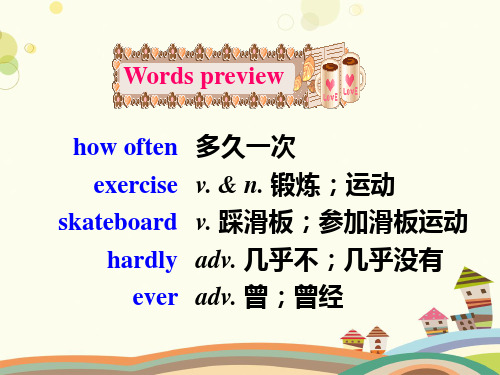

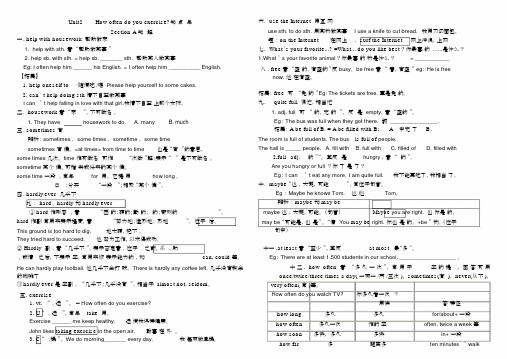
Unit2 How often do you exercise?知点与Section A 知解一. help with housework 帮助做家1.help with sth. 意“帮助做某事”2.help sb. with sth. = help sb. _______ sth. 帮助某人做某事Eg: I often help him ______ his English. = I often help him __________ English.【拓展】1.help oneself to ⋯随便吃 /喝·Please help yourself to some cakes.2.can’ t help doing sth情不自禁做某事I can’ t help falling in love with that girl.我情不自禁上那个女孩。
二. housework 意“家”。
不可数名。
1. They have housework to do. A. many B. much三. sometimes 有辨析: sometimes , some times , sometime , some timesometimes 有候。
=at times= from time to time也是“有”的意思。
some times 几次。
time 作可数名可作“次数”解;表示“ ” 是不可数名。
sometime 某个候。
可指去或将来的某个候。
some time 一段。
常与for 用。
它提用how long 。
口:分开“一段”;相聚“某个候”。
四. hardly ever 几乎不比: hard、 hardly 和 hardly ever① hard 作形容,意“困的;硬的;勤的;的;苛刻的”。
hard 作副常用来表示程度,意“努力地;猛烈地;烈地”,位于后。
This ground is too hard to dig.地太硬,挖不。
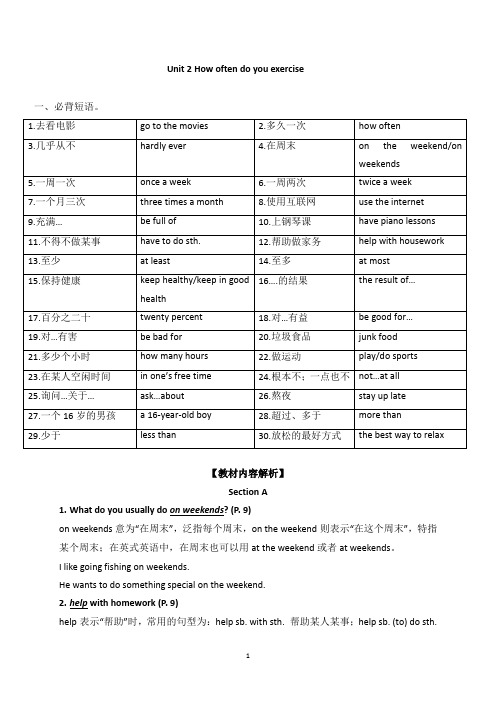
Unit 2 How often do you exercise一、必背短语。
【教材内容解析】Section A1.What do you usually do on weekends? (P. 9)on weekends意为“在周末”,泛指每个周末,on the weekend则表示“在这个周末”,特指某个周末;在英式英语中,在周末也可以用at the weekend或者at weekends。
I like going fishing on weekends.He wants to do something special on the weekend.2.help with homework (P. 9)help表示“帮助”时,常用的句型为:help sb. with sth. 帮助某人某事;help sb. (to) do sth.帮助某人做某事。
Can you help me with my homework?He often helps his mother clean do housework.3.sometimes (P. 9)sometimes是频度副词,意为“有时”,相当于at times。
I sometimes play computer games on weekends.【拓展】辨析sometimes, some times, sometime与some timehardly ever (P. 9)hardly作副词,表示“几乎不”;hard用作副词表示“努力地、猛烈地”,作形容词表示“硬的、困难的”。
He hardly works.He works hard.This is a hard work.5.How often do you watch TV?(P. 9)how often意为“多久一次”用来提问频率,常用表示频率的副词或者短语来回答,如twice a week, sometimes, every day, always等。

Unit2 How often do you exercise单元重点单词housework ['haʊswɜːk] n.家务劳动hardly ['hɑːdli] adv.几乎不;简直不;刚刚ever ['evə(r)] adv.曾经;在任何时候once [wʌns] adv.一次;曾经twice [twaɪs] adv.两倍;两次Internet ['ɪntənet] n.因特网program ['prəʊɡræm] n.节目;程序;课程;节目单full [fʊl] adj.满的;充满的;完全的swing [swɪŋ] n.摇摆;秋千v.摇摆;旋转maybe ['meɪbi] adv.或许;也许;可能swing dance摇摆舞least [liːst] adj.最小的;最少的at least至少hardly ever很少;几乎从不;难得junk n.垃圾;废旧杂物coffee ['kɒfi] n.咖啡;咖啡色health [helθ] n.健康;人的身体或精神状态result [rɪ'zʌlt] .结果;后果percent [pə'sent] adj.百分之...的online [ˌɒn'laɪn] adj.在线的adv.在线地television ['telɪvɪʒn] n.电视机;电视节目although [ɔːl'ðəʊ] conj.虽然;尽管;然而;可是through [θruː] prep.穿过;凭借;一直到body ['bɒdi] n.身体mind [maɪnd] .头脑;想法;意见;心思such [sʌtʃ] adj.这样的;如此的together [tə'ɡeðə(r)] adv.共同;一起die [daɪ] v.死;枯竭;消失writer ['raɪtə(r)] n.作者;作家dentist ['dentɪst] n.牙科医生magazine ['mæɡəziːn] n.杂志however [haʊ'evə(r)] adv.然而;无论如何;不管多么than [ðən] conj.比almost ['ɔːlməʊst] adv.几乎;差不多none [nʌn] pron.没有人;没有任何东西,毫无less [les] adj.更少的;较少的point [pɔɪnt] n.看法;要点;重点;小数点;目标;分数单元重点短语such as例如;诸如junk food n.垃圾食品;无营养食品more than超过;多于;不仅仅;非常less than不到;少于help with housework 帮助做家务on weekends 在周末how often 多久一次hardly ever 几乎从不once a week 每周一次twice a month 每月两次every day 每天be free 有空go to the movies 去看电影use the Internet 用互联网swing dance 摇摆舞play tennis 打网球stay up late 熬夜;睡得很晚at least 至少have dance and piano lessons 上舞蹈课和钢琴课go to bed early 早点睡觉play sports 进行体育活动be good for 对……有好处go camping 去野营not…at all 一点儿也不……in o ne’s free time 在某人的业余时间the most popular 最受欢迎的such as 比如;诸如old habits die hard 积习难改go to the dentist 去看牙医morn than 多于;超过less than 少于help sb. with sth. 帮助某人做某事How about…? ......怎么样?want sb. to do sth. 想让某人做某事How many+可数名词复数+一般疑问句?……有多少……?spend time with sb. 和某人一起度过时光It’s+ adj.+ to do sth. 做某事的……的。

Unit 2 How often do you exercise?课文翻译Section A 2dJack:Hi,Claire,are you free next week?Claire:①Hmm...next week is quite full for me,Jack.Jack:Really?How come?Claire:I have dance and piano lessons.Jack:What kind of dance are you learning?Claire:Oh,swing dance. It's fun!I have class once a week,every Monday.Jack:How often do you have piano lessons?Claire:Twice a week,on Wednesday and Friday.Jack:Well,how about Tuesday?Claire:Oh,I have to play tennis with my friends.But do you want to come?Jack:Sure!,杰克:你好,克莱尔,下周你有空吗?克莱尔:呣……下周我很忙,杰克。
杰克:真的吗?怎么会那样?克莱尔:我上舞蹈课和钢琴课。
杰克:你学习的是什么舞蹈?克莱尔:噢,摇摆舞。
很有趣!我一周上一次课,每周一上课。
杰克:你多久上一次钢琴课?克莱尔:一周两次,在周三和周五。
杰克:噢,周二怎么样?克莱尔:哦,我要与朋友打网球。
你想来参加吗?杰克:当然了!知识详解1.How often do you exercise?你多久锻炼一次?【解读】本句是含有特殊疑问词how often 的特殊疑问句。
【解读】how often 多久一次,用于对动作发生的频率进行提问。
回答应该是频度副词或表示频率的词组,如always,usually,often,sometimes,hardly,ever,never,every day,once a week,three times a day等。

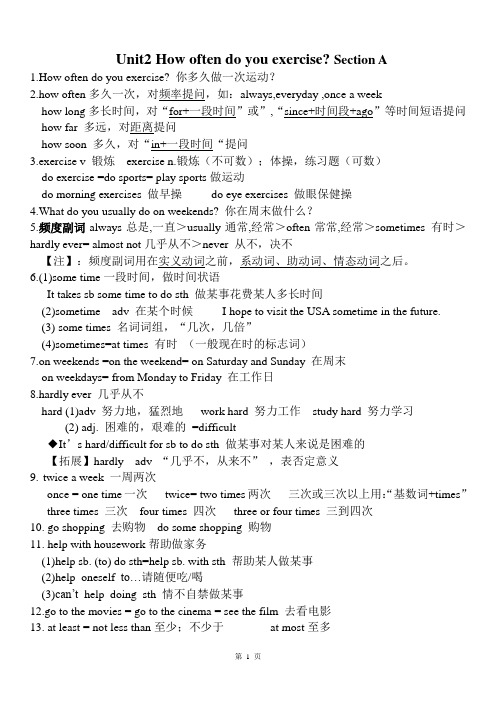
Unit2 How often do you exercise? Section A1.How often do you exercise? 你多久做一次运动?2.how often多久一次,对频率提问,如:always,everyday ,once a weekhow long多长时间,对“for+一段时间”或”,“since+时间段+ago”等时间短语提问how far 多远,对距离提问how soon 多久,对“in+一段时间“提问3.exercise v 锻炼exercise n.锻炼(不可数);体操,练习题(可数)do exercise =do sports= play sports做运动do morning exercises 做早操do eye exercises 做眼保健操4.What do you usually do on weekends? 你在周末做什么?5.频度副词always总是,一直>usually通常,经常>often常常,经常>sometimes 有时>hardly ever= almost not几乎从不>never 从不,决不【注】:频度副词用在实义动词之前,系动词、助动词、情态动词之后。
6.(1)some time一段时间,做时间状语It takes sb some time to do sth 做某事花费某人多长时间(2)sometime adv 在某个时候I hope to visit the USA sometime in the future.(3) some times 名词词组,“几次,几倍”(4)sometimes=at times 有时(一般现在时的标志词)7.on weekends =on the weekend= on Saturday and Sunday 在周末on weekdays= from Monday to Friday 在工作日8.hardly ever 几乎从不hard (1)adv 努力地,猛烈地work hard 努力工作study hard 努力学习(2) adj. 困难的,艰难的=difficult◆It’s hard/difficult for sb to do sth 做某事对某人来说是困难的【拓展】hardly adv “几乎不,从来不”,表否定意义9.twice a week 一周两次once = one time一次twice= two times两次三次或三次以上用:“基数词+times”three times 三次four times 四次three or four times 三到四次10.go shopping 去购物do some shopping 购物11.help with housework帮助做家务(1)help sb. (to) do sth=help sb. with sth 帮助某人做某事(2)help oneself to…请随便吃/喝(3)can’t help doing sth 情不自禁做某事12.go to the movies = go to the cinema = see the film 去看电影13. at least = not less than至少;不少于at most至多14. use the Internet 上网15.What’s your favorite program?=What program do you like best?你最喜欢的节目是什么?16.every day 每天= each day 做状语,放在句末,对其提问用how ofteneveryday = daily adj. 每天的,作定语,修饰名词,放在名词之前He exercises every day. 他每天都锻炼。
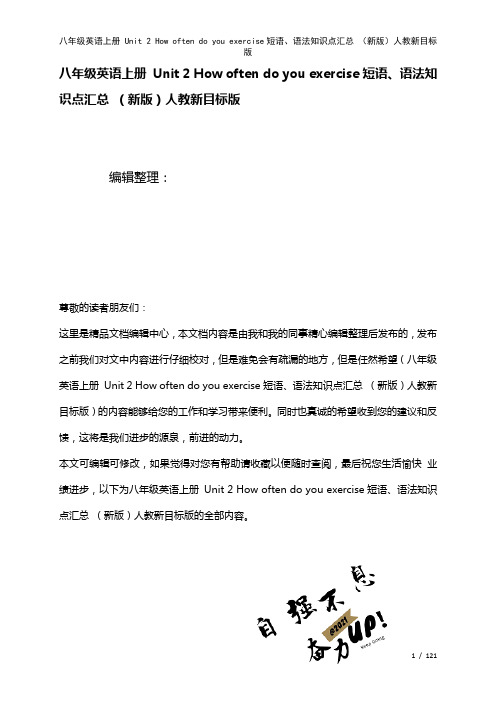
八年级英语上册Unit 2 How often do you exercise短语、语法知识点汇总(新版)人教新目标版编辑整理:尊敬的读者朋友们:这里是精品文档编辑中心,本文档内容是由我和我的同事精心编辑整理后发布的,发布之前我们对文中内容进行仔细校对,但是难免会有疏漏的地方,但是任然希望(八年级英语上册Unit 2 How often do you exercise短语、语法知识点汇总(新版)人教新目标版)的内容能够给您的工作和学习带来便利。
同时也真诚的希望收到您的建议和反馈,这将是我们进步的源泉,前进的动力。
本文可编辑可修改,如果觉得对您有帮助请收藏以便随时查阅,最后祝您生活愉快业绩进步,以下为八年级英语上册Unit 2 How often do you exercise短语、语法知识点汇总(新版)人教新目标版的全部内容。
Unit 2 How often do you exercise 一、必背短语.【教材内容解析】Section A1.What do you usually do on weekends? (P. 9)on weekends意为“在周末”,泛指每个周末,on the weekend则表示“在这个周末”,特指某个周末;在英式英语中,在周末也可以用at the weekend或者at weekends。
I like going fishing on weekends。
He wants to do something special on the weekend.2.help with homework (P. 9)help表示“帮助”时,常用的句型为:help sb. with sth。
帮助某人某事;help sb. (to) do sth. 帮助某人做某事。
Can you help me with my homework?He often helps his mother clean do housework.3.sometimes(P。

Unit2How often do you exercise?一、要点短help with housework帮助做家on weekends 在周末how often 多久一次hardly ever 几乎从不once a week 每周一次twice a month 每个月两次be free 有空go to the movies 去看影use the Internet 用互网swing dance 舞play tennis 打网球stay up late 熬夜;睡得很晚go to bed early 早点睡play sports 行体育活be good for ⋯⋯有好go camping 去野not ⋯ at all一点儿也不in one ’ s free time在某人的余the most popular 最受迎的such as 比方;如old habits die hard 改go to the dentist 去看牙医more than 多于;超less than 少于at least 起码have dance and piano lessons 上舞蹈和琴二、句型萃help sb. with sth. 帮助某人做某事How about ⋯ ?......怎么? / ⋯⋯好不好?want sb. to do sth. 想某人做某事How many+ 可数名复数 +一般疑句?⋯有多少⋯?主 +find+that 从句 .⋯⋯⋯⋯spend time with sb. 和某人一同度光It ’ s+ adj.+ to do sth做.某事是⋯⋯的。
ask sb. about sth. 向某人某事by doing sth. 通做某事What’ s your favorite你⋯⋯?最喜的⋯ 是什么?the best way to do sth. 做某事的最好方式三、元法度副1.度副:表示作生隔(既率)的副。


Unit2. How often do you exercise每天她都遛狗。
I should eat less food and take more exercise.9.子某事最好的方法”,其中e great progress.g, he knows a lot.) forty classes every week.Unit 2 How often do you exercise?一.单项选择(25分)1.---The best way to make progress(取得进步) is ______ practice.---I think so.A. WithB. AcrossC. InD. Through2.---Are all of your friends late for your birthday party?---No, ______ of them are late. They come to the party early.A. SomeB. AnyC. NoneD. Few3.The woman ______ leaves her house, because she can’t walk far.A. UsuallyB. EverC. HardlyD. Always4.This book is ______ of pictures. It’s fit(适合) for children.A. DifferentB. RealC. PopularD. Full5.Don’t eat too much junk food. It’s bad for your ______.A. Mouth B, mind C. Health D. Head6.It’s raining hard now. ______, I still want to shopping with my friends.A. SoB. BecauseC. HoweverD. Then7.Mike got ninety-eight ______ and he did best in the math test.A. PointsB. HoursC. MinutesD. Money8.It’s ______ 12 o’clock. Let’s go home to have lunch.A. StillB. AlmostC. OnlyD. Usually9.---Excuse me. Could you tell me the ______ of the football game last night?---Of course I can. We got the first place.A. ResultB. DifferenceC. StoryD. Rule10.I try to eat junk food only once a month ______ I love it.A. SoB. AlthoughC. IfD. But11.---What does your mother do?---She’s a(n) ______. She works in a hospital.A. ActressB. WriterC. TeacherD. Dentist12.David is interested in sports, ______ basketball, tennis and ping-pong.A. Such asB. Because ofC. All in allD. Lots of13.Don’t worry. The little animals can’t ______ from the cold, because people look after them well in winter.A. DieB. StopC. WakeD. Blow14.---Why do you feel so tired today?---Oh, I slept ______ five hours last night.A. Less thanB. Many moreC. More thanD. Many less15.My daughter plays the piano ______, usually on Monday and Wednesday.A. Once a weekB. Twice a weekC. Once a monthD. Twice month16.Everyone needs to have ______ eight hours’ sleep at night.A. At leastB. At lastC. At allD. At home17.---_______ does she practice the guitar?---Every day.A. How longB. How farC. How manyD. How often18.---What does Nancy usually do after school?---______.A. She has piano lesson on MondayB. Her favorite sport is swimmingC. She usually goes swimmingD. She thinks it’s interesting19.---_______?---Twice a week.A. How do you like the InternetB. How many times do you use the Internet a weekC. What time do you use the InternetD. What do you usually do on the Internet21.She is ______girl.She always gets good grades.A.such a clever B.s o a cleverC.such clever a D.so clever22.______Mum asked me to close the door,______I forgot to do so.wA.Though;but B.Although;butC.But;/ D Although;23.Though he eats many vegetables to keep______,he is in bad______.A.health;health B.healthy;healthyC.healthy;health D.health;healthy24.Do you think the best way to relax is ______ exercise?A.though B.throughC.over D.across25.It's very cold today.Please keep the door______A.close B.closedC.open D.opened二.阅读理解ARunning is more popular these days. Many of us run for our health. Doctors say many health problems come from these bad habits: eating and drinking too much, smoking(吸烟) and not taking enough exercise. Doctors tell us, "Eat and drink less, don't smoke, and exercise more."Running is a kind of exercise because it helps build a healthy body. It also helps most people become(变得) thin. One 68-year-old woman runs three times a week. "I love eating," she says. She runs to become thin.Running is good for our health in other ways, too. Many runners say running keeps colds and other small health problems away. "Running is my doctor," says one man.Running can also help people to relax. So today men and women of all ages enjoy running.1.Many people enjoy running because they want to______.A. Eat muchB. Keep healthyC. Run fastD. Save time2.Doctors tell us______.A. Not to smokeB. Not to exerciseC. To drink muchD. To eat much3.How often does the old woman run?A. Twice a weekB. Three times a weekC. Once a monthD. Three times a month4.The third paragraph shows______.A. running helps people to relaxB. people who like running have many healthy problemsC. running helps build a healthy bodyD.people who like running have fewer healthy problems5.The writer mainly(主要) tell us______.A. how to runB. How to become thinC. running is a good way to keep healthyD.running is better than doctors三.任务型阅读Joy loves instant noodles (方便面). She eats them at least once a week. She has a way to makethem more delicious. She writes:“Although I know it is not good for me to eat a lot, I still lov e instant noodles — I think theyarecheap and delicious. When I cook them, I often add (加) something to make them more delicious.”“I discard (丢弃) their flavorings (调味品).I make the ‘flavoring’ myself. When I cook the noodles, I always put an egg in the m. I love eggs.They are one of my favorites. Sometimes I put some pieces of meat. I also put some vegetables, sometimes cabbages and sometimes broccoli. Yesterday I tried tomatoes. They tasted great! Next time I’d liketo try some beans. After I enjoy in stant noodles, I often go for a walk in the park. I feel great.”1. How often does Joy eat instant noodles?She eats them at least .2. What does Joy think of instant noodles?She thinks they are .3. How does Joy deal with (处理) the flavorings of instant noodles? She always , and makes the “flavoring” herself.4. What does Joy always put in instant noodles?She always puts in them.5. Where does Joy often go for a walk after enjoying instant noodles?She often goes for a walk after enjoying instant noodles.四.用所给动词的正确形式填空(5分)1. You should _______(go) to see a doctor.2. Mother asked me ________(get) up early.3. Let’s _______(try) ou r best to make our world more beautiful.4. He ________(leave) his bag at school yesterday.5. ---I found it difficult _______________(get) to sleep in the night.--- You’d better_____________________(take) some sleeping pills.五、.句型转换(10分)1.You should write him a letter.(就划线部分提问)__________ _________ _________do?2. I think you should finish your homework first.(改为否定句)________ ________ ________ you should finish your homework first3. I visit my grandma once a week.(就划线部分提问)__________ _________ do you visit your grandma?4. I met my English teacher last night.(改为一般疑问句)________ ________ ________your English teacher last night?5. He has some money ,too.(改为否定句)He ________ ________ ________money, ________.六.书面表达(满分15分)根据下列班级活动调查表,用英语写一篇短文。

Unit 2 How often do you exercise Words and expressionshousework/'haʊswɜː(r)k/ n. 家务劳动;家务事hardly /'hɑː(r)dli/ adv. 几乎不;几乎没有ever /'evə(r)/ adv. 在任何时候;从来;曾经hardly ever 几乎从不once /wʌns/ adv. 一次;曾经twice /twaɪs/ adv. 两次;两倍Internet /'ɪntə(r)net/ n. (国际)互联网;因特网program /'prəʊɡræm/n. (=programme) 节目full /fʊl/ adj. 忙的;满的;充满的swing /swɪŋ/ n. 摆动;秋千v. (使) 摆动;摇摆swing dance 摇摆舞maybe /'meɪbi/ adv. 大概;或许;可能least /liːst/ adv. 最小;最少adj. & pron. 最小的;最少的at least 至少;不少于;起码junk /dʒʌŋk/ n. 无用的东西;无价值的东西junk food 垃圾食品coffee /'kɒfi/ n. 咖啡health /helθ/ n. 健康;人的身体(或精神)状态result /rɪ'zʌlt/ n. 结果;后果percent /pə(r)'sent/ n. (= per cent) 百分之……online /ˌɒn'laɪn/ adj. & adv. 在线(的);联网(的) television /'telɪvɪʒn/ n. 电视节目;电视机although /ɔːl'ðəʊ/ conj. 虽然;尽管;即使through /θruː/ prep. 以;凭借;穿过mind /maɪnd/ n. 头脑;心智body /'bɒdi/ n. 身体such /sʌtʃ/ adj. & pron. 这样的;那样的;类似的such as 例如;像……这样together /tə'geðə(r)/ adv. 在一起;共同die /daɪ/ v. 消失;灭亡;死亡writer /'raɪtə(r)/ n. 作者;作家dentist /'dentɪst/ n. 牙科医生 magazine /ˌmægə'ziːn/ n. 杂志;期刊 however /haʊ'evə(r)/ adv. 然而;不过than /ðæn/prep. & conj.(用以引出比较的第二部分)比more than 多于almost /'ɔːlməʊst/ adv. 几乎;差不多none /nʌn/ pron. 没有一个;毫无less /les/ adv. 较少;较小adj. & pron. 较少的;更少的less than 少于point /pɔɪnt/ n. 得分;点Claire /kleə/ 克莱尔 (女名)Sue /suː/ 休 (女名)American Teenager /'tiːneɪdʒə(r)/《美国青少年》(文中为虚构的杂志名称)Role-playJack: Hi, Claire, are you free next week?Claire: Hmm…next week is quite full for me, Jack.Jack: Really? How come?Claire: I have dance and piano lessons.Jack: What kind of dance are you learning?Claire: Oh, swing dance. It’s fun! I have class once a week, every Monday.Jack: How often do you have pianolessons? Claire: Twice a week, onWednesday and Friday. Jack: Well,how about Tuesday?Claire: Oh, I have to play tennis with my friends. But do you want to come?Jack: Sure!Grammar FocusWhat do you usuallydo on weekends?What do they do on weekends? What does she do on weekends? How often do you go to the movies?How often does he watch TV? Do you go shopping? I always exercise.They often help with housework. She sometimes goes shopping.I go to the movies maybe once a month.He hardly ever watches TV. No, I never go shopping.Complete the questions with do or does. Then match the questions and answers.1.How oftenhe play soccer?2. you drinkmilk?3.How oftenthey stay up late?4. Sue eat ahealthy breakfast?5.How oftenyou eat apples?6. your parents play sports?a.Yes. She usually does.b.Hardly ever. Idon’t like them.c.He plays at leasttwice a week. d.No,theydon’t.They’retoobu sy.e.Never. They always go to bed early.f.Yes, I do. Every day.ReadingRead the article and fill in the blanks.What do No. 5 High School Students Do in Their Free Time? Last month we asked our students about their free time activities. Our questions were about exercise, use of the Internet and watching TV. Here are the results.We found that only fifteen percent of our students exercise every day. Forty-five percent exercise four to six times a week. Twenty percent exercise only one to three times a week. And twenty percent do not exercise at all!We all know that many students often go online, but we were surprised that ninety percent of them use the Internet every day. The other ten percent use it at least three or four times a week. Most students use it for fun and not for homework.The answers to our questions about watching television were also interesting. Only two percent of the students watch TV one to three times a week. Thirteen percent watch TV four to six times a week. And eighty-five percent watch TV every day! Although many students like to watch sports, game shows are the most popular.It is good to relax by using the Internet or watching game shows, but we think the best way to relax is through exercise. It is healthy for the mind and the body. Exercise such as playing sports is fun, and you can spend time with your friends and family as you play together. And remember, “old habits die hard”. So start exercising before it’s too late!Exercise% 1-3 times a week % every day% 4-6 times a week% no exerciseUse the Internet%everyday Watch TV% 1-3 times a week% every day % 3-4 times a week % 4-6 times a weekExercises一、根据句子意思及汉语提示填写单词 (每空一词)1. (虽然;尽管) she is young, she can speak Englishvery well.2.Everyone knows that a good eating habit is good for our(健康).3.We all know that Mo Yan is a famous (作家).4.In our class, ninetygirls.(百分之……) of the students are5.Sid is lazy, so he (几乎不) exercises.6.Let’s go (在一起;共同)!7.The meeting room is (充满的) of people.8.Please don’t tell mom the (结果) of the test. Iwant to give her a surprise.9. (在线的) shopping is popular among young people.10.Her mom goes shopping (两次) a week.11.—Do you know when the sports meeting is?—I don’t know. Let’s ask the monitor. (或许) he knows.12.Be early next time. You (几乎) missed the bus.二、单项选择( )13. Helen was so excited at the news that she could say a word.A.everB. almostC. hardlyD.always( )14. —Ms. Lin is very popular among thestudents.—Yes. Her classes are lively (生动的) and interesting.A. sometimesB. alwaysC. hardlyD. never( )15. We play sports on school days. You know, we don’t have enough time.A. oftenB. usuallyC. hardlyD. ever( )16. —How often do you go shopping?—ever. I don’t like shopping at all.A. UsuallyB. NeverC. HardlyD.Always( )17. —How often does yoursister surf the Internet?—About .A. three timeB. three timesC. every day three timeD. threetimes a day ( )18. —Howoften do you drink milk?—.A. Less than oneB. One or two hoursC. For a long timeD. Once or twice a day( )19. I think twenty percent of the students WangFei’s new songs.A. likes listening toB. like to listenC. likes to listenD. likelistening to ( )20. he is verytired, he doesn’t stop working.A. SoB. ButC. AndD.Although ( )21. it rained hard, hestill worked in the field.A. Although; andB. Although; /C. But; althoughD. Although; but三、根据提示完成句子22.我至少一周打扫一次房间。